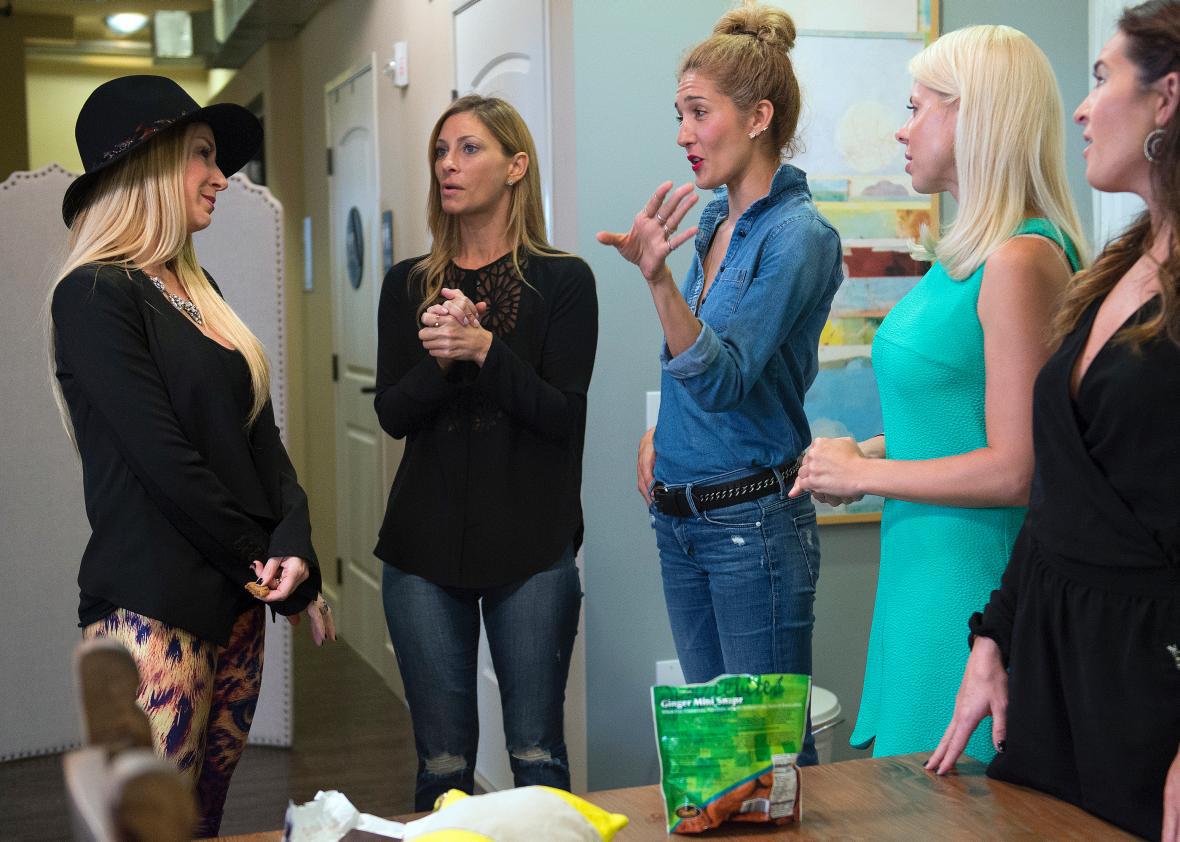Anton Chekhov’s famous storytelling rule is that if a gun appears at the beginning of a work, it has to be fired by the end. Bravo’s method for storytelling is to hand every cast member a gun at the beginning, and then sit back and watch as these emotional assassins clumsily, and often incoherently, fire bullets at one another. It’s a formula that’s worked well for the reality juggernaut that is the Real Housewives franchise, and that Bravo has replicated in the new unscripted show There Goes the Motherhood, which premiered Wednesday night.
The show stars seven bronzed and coiffed women, all with access to many-zeroed bank accounts to which they don’t contribute. (Yes, they are mothers. Yes, care work is real work. The point isn’t that they don’t do anything, just that they are all rich.) The conceit is that they belong to one of “the most coveted mommy groups in” Los Angeles, in which they are supposed to seek and provide support from and for the other moms. But this is Bravo, so instead we get lots of sideways eye rolls and occasional full-frontal personal attacks, the content of which frequently has little to do with parenting. One would hope that the specter of their children, if not their actual presence at family get-togethers, would prompt these women to at least conceal, if not put down, their weapons once in awhile. This rarely happens (at least not in the three episodes released to the press).
The show’s got all the patriarchal trappings familiar to consumers of reality television. Most of the moms subscribe to a code of conduct that requires them to keep their bodies whippet thin and heels three inches high—during the day. Among the group, there’s only one whose husband treats her with respect; the other moms are either divorced or, to varying degrees, playing first base to their husband’s starting pitcher. One says, without a hint of irony, that “a woman who marries and lets herself go is not living up to what being a good wife is.”
Buried beneath all the misogyny, oversized vehicles, glittering pools, and inter-mom group bickering lies a very important—if unintentional—message for all moms. This is the fact that motherhood is not a sisterhood, and treating it like it is often hurts women more than it helps us.
The institution of the mommy group rests on the idea that being a mom is enough of a commonality to build a friendship on. It’s not. As a friend of mine put it, after deciding that she had enough with her mommy group, “Just because these women and I happened to have sex around the same time doesn’t mean we should be friends.” The problem with the belief that all moms are natural and inevitable cheerleaders for one another is that it obscures the fact that we are individuals with a grab bag of preferences over how we live and parent.
There Goes the Motherhood is an extreme, if not farcical, take on what happens when women operate under this assumption. These women, who include a bleach blond former waitress, a meditating haute bohème, a downbeat single mom, and a tomboyish exhausted mom of three, are not well-suited to give one another advice about life or parenting. Their lives are too different. One mom co-sleeps; another locks her kids in at night. As long as everyone is safe, nobody should care. But the mommy group isn’t set up for that sort of reasoning, and so conflicts over relatively trivial choices ensue.
Just because motherhood doesn’t automatically bond women together doesn’t mean that all mommy groups are useless. At their best, mommy groups can be a safe space for women to talk about the issues surrounding motherhood, as in Elizabeth Isadora Gold’s recent memoir The Mommy Group. Gold was so moved by the nurturing dynamic of her mommy group that she decided to write a whole book about it. But even though motherhood is what happened to bring these women together, the friendships they formed were based on far more than having children of a similar age.
More frustrating than the fallacy of the inevitable mom-to-mom bond is the sad fact that moms often seek support from other moms because they aren’t getting enough of it from anyone else. While the average dad is more supportive than the entitled bros on There Goes the Motherhood, the average mom is still saddled with more domestic duties than her partner. Add to this our subpar childcare and paid leave policies, and many moms have little or no relief from their parenting duties. Getting support from other moms is great when it works, but maybe we should ask why moms need so much support in the first place.
